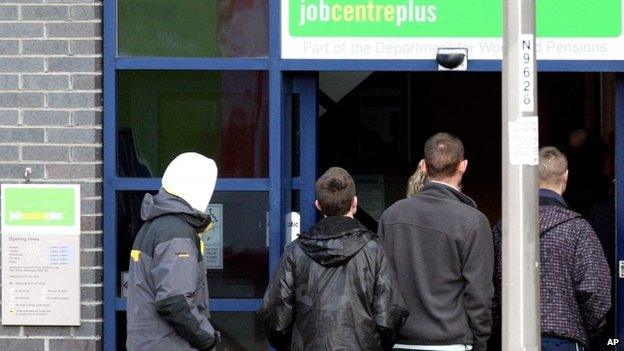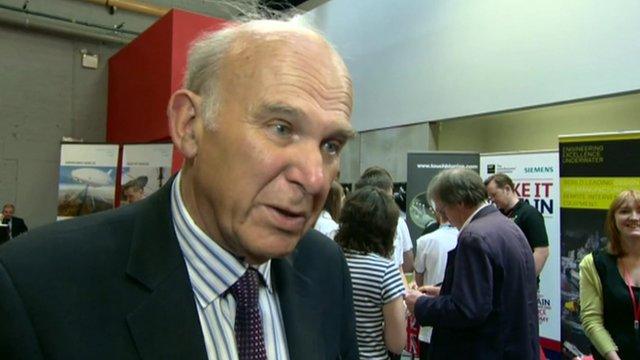Zero-hours contracts: rules give workers more choice
- Published

The government says the ban will affect 125,000 workers
Employers are to be banned from stopping staff with zero-hours contracts seeking extra work elsewhere.
Business Secretary Vince Cable said "unscrupulous" firms had abused the flexibility offered by the contracts.
Unions and campaign groups have been pressing for zero-hours contracts - under which employees' hours are not guaranteed - to be banned.
But Mr Cable said they had a place in the labour market, and offered work to students and older people.
"For many workers this is a perfectly sensible arrangement. But a lot of people on the contracts aren't sure what their rights are and we want to make them [zero-hour contracts] more transparent so people know what their rights are," Mr Cable told BBC's Radio 4.
'Zero-sum game'
The ban will benefit 125,000 zero-hours contract workers estimated to be tied to an exclusivity clause and will allow workers to look for additional work to boost their income, according to the Business Department.
But Steve Turner, assistant general secretary of the Unite union, said: "Zero-hours contracts are a zero-sum game for workers struggling to get by. The only winner is the employer."

Without guaranteed work, zero hours can mean a frustrating wait for a call from your employer
The government received more than 36,000 responses to its consultation, with 83% in favour of banning exclusivity clauses.
Mr Cable also announced a consultation on how to stop rogue employers evading the ban through measures such as offering one-hour fixed contracts.
The Office for National Statistics recently estimated that employers held 1.4 million contracts with workers that did not guarantee a minimum number of hours.
Chuka Umunna, Labour's shadow business secretary, said the root of the problem was the contracts becoming widely accepted as normal.
Employers are to be banned from stopping employees with zero-hours contracts seeking extra work elsewhere as John Moylan reports
"Zero-hours contracts, which were once a niche and marginal concept, have become the norm in parts of our economy as families have been hit by the cost-of-living crisis," he said.
'Minimum hours'
Unions called for greater reform, including a guaranteed number of hours.
TUC general secretary Frances O'Grady said: "The ban is welcome news but it's not nearly enough to really tackle the problem. A lack of certainty is the real issue."
"Far too many employees have no idea from one week to the next just how many hours they'll be working or more importantly how much money they'll earn. This makes managing household budgets stressful and organising childcare very difficult indeed."
"The one change that would really make a difference would be for employers to have to guarantee their staff a minimum number of paid hours each week. And, as the economy continues to grow, that would give many zero hours workers struggling to get by a much-needed pay rise."
Flexibility
John Longworth, director general of the British Chambers of Commerce, said: "Maintaining the UK's flexible labour market is crucial to keeping unemployment down. Zero-hours contracts are vital for a successful jobs market, but they must be fair and work for all parties.
"The ban on exclusivity clauses, which bind workers to one firm, is a balanced way of addressing concerns. However, the government must ensure that any further changes do not jeopardise business flexibility or employment opportunities."
The Institute of Directors said it liked the contracts because they helped ensure a "flexible work market," but added that "flexibility must work for both staff and business," and exclusivity clauses should be banned.
- Published25 June 2014

- Published6 May 2014

- Published30 April 2014

- Published5 August 2013
